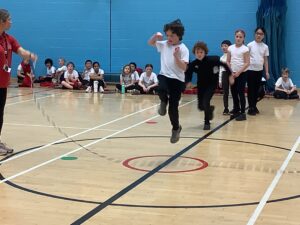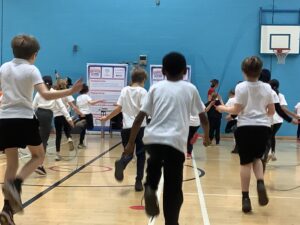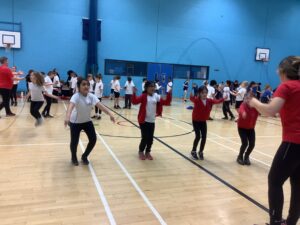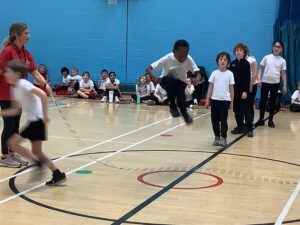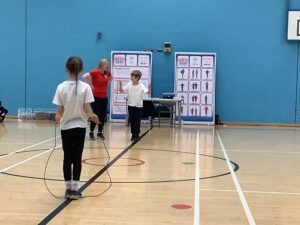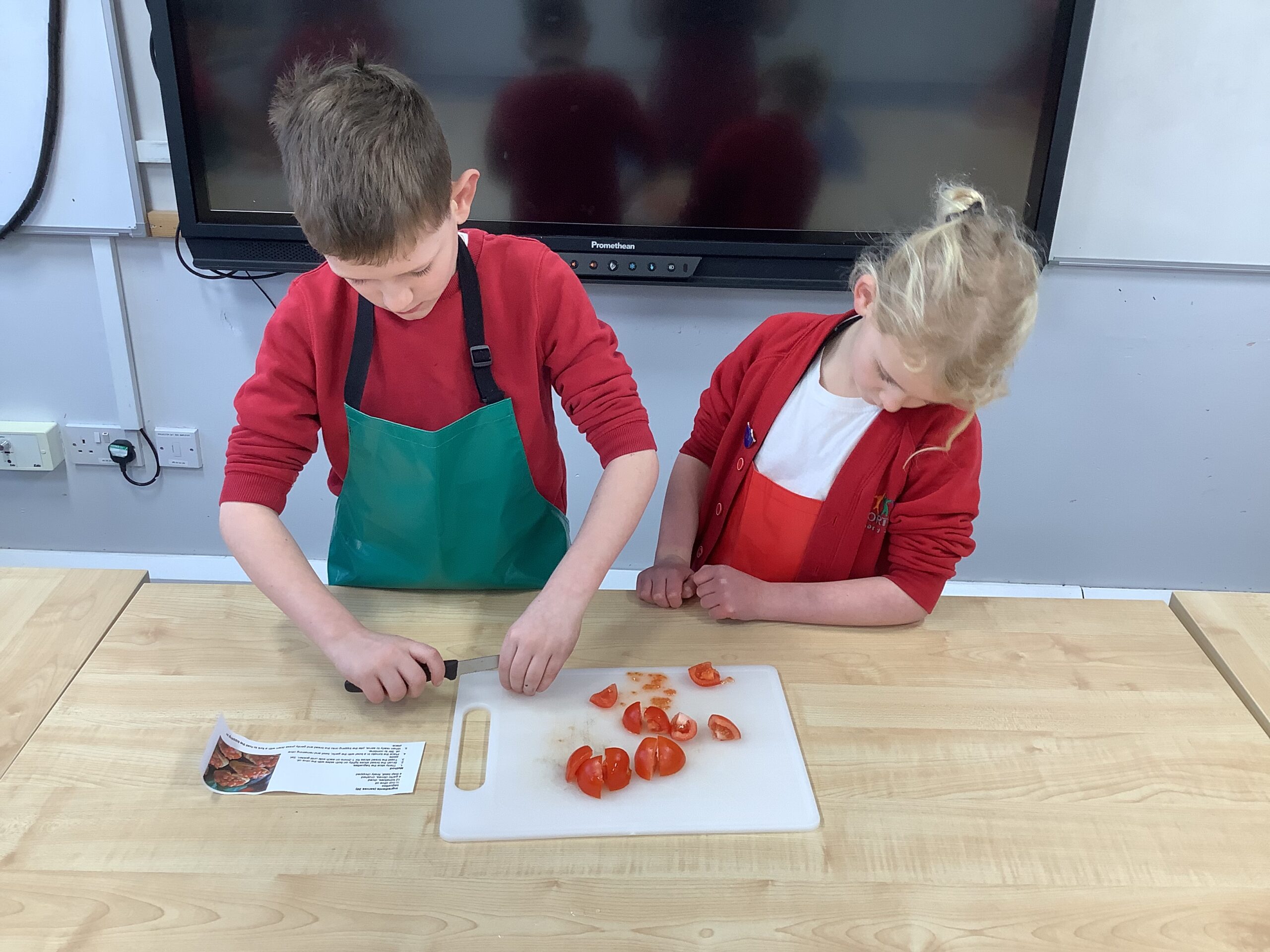Skipping Festival 2025
Today, Year 4 took part in the 2025 Skipping Festival and won! This means we’re through to the finals in June and we can’t wait.
They did a brilliant job and worked so well as a team – all their practising definitely paid off! It was amazing to watch them all showcase their incredible skipping skills. They also showed great support for each other and the other teams. I was so impressed by their determination, teamwork and respect.
In between the skills, the children had the chance to skip, dance and sing along to the music which they loved. They even got the chance to learn some new skipping skills like the butterfly.
Both the individual skills and the group skips were fantastic. Your children won lots of awards – including seven gold medals! We were all so happy to win and be through to the finals in June.
Well done Year 4 for trying your best and representing Moortown so well – we’re so proud of you! Let’s do it all again in June!
PE: Rugby
This half term, our PE unit is rugby. We will be practising lots of different skills: catching, passing/throwing, evading a defender, tackling an attacker and kicking.
We learnt in our first lesson this week how to pass with accuracy. You need to see the target, pass and then point. The pointing helps to direct the ball towards the target more easily.
Help at home: What do you already know about rugby? Is there any specific words to help us with our learning?
Food Technology – Bruschetta!
This morning, Year 3 have been making Bruschetta. We were so impressed with their knowledge and skills at each stage of the recipe.
The main skill we were practising was cutting with a knife. The two different techniques that we used were the bridge and the claw. We used the bridge to safely and securely cut the tomatoes into small chunks. We used the claw to cut the basil up into smaller pieces.
We then used a garlic crusher to squeeze the garlic into our tomato and basil mixture. It’s safe to say the room smelt very strong!
The final challenge was to spoon the mixture onto the sliced and toasted baguette without making a mess and then to dig in… some of them gave it a 10/10!
Help at home by re-making the recipe the home. It’s been sent home with your child today. Could you add something new; ham, cheese or salmon?
What is a computer network?
A computer network is two or more computers that are connected. They can share information more easily and it can be safer.
A computer network is made up of four parts: the server, switch, clients and cables.
Help at home by asking your child to tell you a bit about what each part does! If you need any help, the pictures below will definitely give you the right information.
In the coming weeks, we’ll be coding a microbit, which we’re all really excited for! So watch this space!

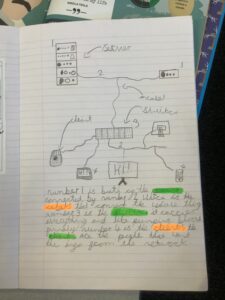
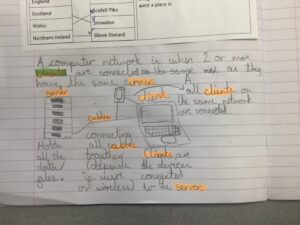








Leeds Beckett tennis
This week, Nic and Sky, tennis coaches from Beckett Sport Juniors, came to deliver a tennis themed assembly.
Here are the details of a special offer they are offering for Moortown pupils.

Living and learning: internet safety
This week, it was Safer Internet Day and we spent the day focusing on these two key areas of online safety.
- I know that some things online may not be true (people and information).
- I know that I shouldn’t share personal information online.
We used some different texts to support this learning and our daily poem too.

We joined together with Year 1 to hot seat the characters. This helped us to think about their feelings and actions.


This video also reinforced key messages about not everything online is true (this could be people or information) and the importance of not sharing any of your personal information.

We used our Living and Learning statement to think about the importance of always being respectful.

People should be respectful online because if you aren’t, others won’t be respectful to you.
It’s like bullying if you keep doing it.
It’s just like saying something mean in real life and we wouldn’t do that.
It can hurt other peoples’ feelings.
Dave from d:side visited last week to reinforce lots of internet safety messages. He was very impressed with the knowledge and understanding from the children.


Throughout this learning, we reinforced the message that if the children were unsure or something didn’t feel right they should always Start Telling Other People and let a trusted adult know.
Help at home: Can your child tell you the key messages from the texts we read?
Finally, our online safety section has further support available for parents.
Topic: What are volcanoes? Are they good or bad?
After spending this half term learning as much as there is to know about volcanoes, it was the children’s time to show off their knowledge.
They created a poster style spread in their books. Here are just some of the amazing ones they produced!





They thoroughly enjoyed this topic and we immersed ourselves by writing reports about volcanoes and learning about rocks in science too.
Help at home: Keep an eye out for recent volcanic activity around the world. This is a great place to start: https://www.bbc.co.uk/news/topics/c340r9zgpnkt
Geography and Wrtiting!
This week we have been finishing off our Geography topic all about our local community. During our walk around Moortown, we completed a survey about what we liked and disliked about the local area. Afterwards, discussed what we would like to change about our locality. The class decided that it would be great if there were some more trees in The Green. So, we did another survey! This time we asked every class in school whether they would like more trees – the answer was a unanimous yes! Most children wanted some apple trees.

We then set about trying to make it happen! First step, persuade Mrs Weekes by sending her a letter. The children did an amazing job with their letters and they were delivered to Mrs Weekes on Thursday. We are awaiting her reply…


Help at home by discussing with your child ways to improve our locality. You could also discuss how we can persuade Mrs Weekes further to put apple trees in The Green.
Writing & Geography – Letters to Steve Reed
This half term’s geography learning has culminated in a letter to our Environment Minister, Steve Reed.
We want to urge him to take climate change even more seriously after what we’ve found out about how it’s impacting the world around us.


We have been learning about how melting ice caps, due to global warming, and therefore rising sea levels have been catastrophic for places around the world like Kale Island in the Solomon Islands.


We have learnt about how this change in sea level and more extreme weathers are leading to a rise in coastal erosion. Places like Skipsea suffer directly with damage to people’s homes, a decrease in tourism and sadly, in rare cases, loss of life.


We are writing to Steve Reed with several recommendations for how he can make effective changes. In addition, we are including a range of persuasive devices like flattery, emotive language and rhetorical questions.


Help at home by rereading this post to find all the examples of formal language.

“We wrote the letters into our books. Then we edited them and published them onto laptops to save paper,” explained Charlie.
Raheem said, “We’re writing this to make sure that Steve Reed will listen to our concerns.”
“It’s a nice experience because it’s a change from our normal handwritten letters or writing lessons,” beamed Luca.
Spring 1 : Week 6 Internet Safety day
We have had a very exciting week in reception. Every half term we have a zoom meeting with famer Verity. She shows us around her farm so we can see how it changes throughout the year. This week, we got to see lots of lambs. Two had just been born and we got to name them. We chose to name them Moortown and Reception.


Math
During maths this week we have been looking at measure. The children have been exploring different ways to measure the length of things.




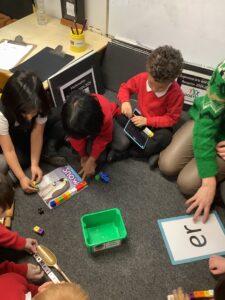



Internet safety
During internet safety day, we shared a story about a child called Mog who was watching a video they liked that then changed to a video that they didn’t like. The children were great at suggesting what Mog should do. The suggestions included tell a grown up and go do something that makes her happy. We also shared a story called Chicken Clicking. The chicken was going on someone else’s laptop and ordering lots of things without permission. We discussed the importance of always asking our grown up before going online.
There will be no phonic or poem sheet sent home this week however there will be a Wow moment sheet and two math challenge sponsership sheets.
Have a lovely half term and we look forward to seeing you refreshed after a week off.

